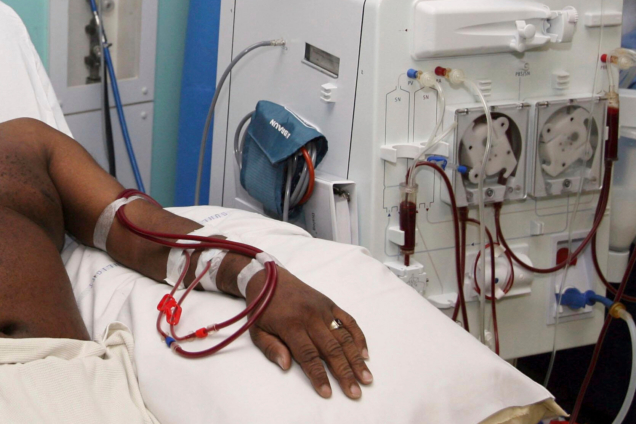Pharmacist and Fellow of the Ghana Centre for Democratic Development (CDD-Ghana), Kwame Sarpong Asiedu says 90% of Ghana’s working population has been priced out of the dialysis market.
His comment follows the call from the Korle Bu Teaching Hospital to Parliament urging legislators to upwards revise the cost of dialysis from GH¢380 to GH¢765.
The hospital had argued that keeping the cost of dialysis at GH¢380 is unsustainable following the removal of tax and excise duty exemptions on consumables.
The hospital has already incurred a 4 million cedi debt which has already started to balloon following the renal unit’s forced opening by the sector minister’s directive earlier this week.
Breaking down the cost renal patients would have to shoulder to stay alive in the country if the new charges are approved; Dr. Sarpong Asiedu said patients would need to raise 85,000 cedis annually to get treatment.
“Korle Bu is a government facility, so if we use that as an average what faces patients in the country is what we identified at the talk leadership event that they need about 85,000 cedis annually just to stay alive.
“That doesn’t include their [inaudible] and all the other things and their vitamins and irons that they have to take, it is just for dialysis. They need 85,000 Ghana cedis,” he said on Joy FM’s Super Morning Show..
The situation he said becomes graver when it is taken into consideration that about 70% of the Ghanaian population earns less than 3,000 cedis a month.
This he said means, “90% of Ghanaian workers are priced out of the dialysis market just to stay alive.
“So what it means is that if you have been listening to us speaking about this matter and you feel that you have robust kidneys, pray that it doesn’t befall you or it doesn’t befall your family member or distant relative because you would have to be part of the network that will cough up that 85,000 cedis every single year.
“And if you break 85,000 cedis by 12, you’d ask yourself, how many people can afford that and pay their bills; water, electricity, buy fuel for their car, pay their children’s school fees.”
Government, meanwhile, has announced that the cost of dialysis will soon be migrated to the National Health Insurance Scheme.
However reacting to the directive, the CDD Fellow said it is untenable for the government to suggest stopgap measures to the dialysis crisis rather than addressing the actual problem.
Dr. Sarpong Asiedu said not only was the government’s solution unviable in the absence of a robust financial structure for the scheme; it refuses to address the problems plaguing the general healthcare system in the country.
He explained that without the government clearing the debt owed by the hospital and uncapping funds to the NHIS, the government’s solution would soon prove unsustainable.
“It is not a problem that we should just sit down and paper over the cracks like the government is trying to do in their populist announcement. We need to deal with it.
“I strongly believe that the national health insurance scheme is the route to go, but if it has to be the route to go, then it needs to be capital injection,” he said.
Latest Stories
-
KPMG report exonerates us – SML
4 seconds -
Works and Housing Ministry seeks lasting solutions to challenges with stakeholders engagement
9 mins -
President’s statement on GRA-SML contract underlines Fourth Estate’s revelation – MFWA
13 mins -
Director urges parents to protect children from abuse
50 mins -
Imani-Ghana criticises Akufo-Addo for not lauding Fourth Estate’s contribution to social development
57 mins -
Man remanded for allegedly stabbing businessman with broken bottle and screwdriver
1 hour -
Population in Kumasi Central Prison surges to 1800, threefold exceeding capacity
2 hours -
NPP to conduct La Dadekotopon parliamentary primary today
2 hours -
KPMG’s report on GRA and SML deal, government white paper on report and matters arising
2 hours -
I won’t reply to Chris Brown tour criticism – Ayra Star
2 hours -
British Columbia to back off drug decriminalisation project
2 hours -
Veteran commentator Joe Lartey Sr dies at 96
2 hours -
Livestream: Newsfile discusses KPMG report on SML deal, ILO on SSNIT reserves and NDC’s running mate
2 hours -
Ghanaian activist hugs over 1,100 trees in an hour to set Guinness World Records
2 hours -
Mathew Anim Cudjoe’s Dundee United promoted to Scottish Premiership after Championship win
2 hours

